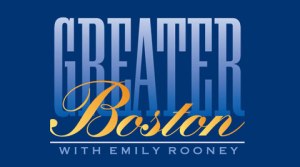On Feb. 6, 1997, just after the debut of “Greater Boston” on WGBH-TV (Channel 2), I wrote an article for The Boston Phoenix on the state of the city’s two major public broadcasters, WGBH and WBUR. It was the first time I’d met the host, Emily Rooney. The original is online here, but, as you will see, it’s unreadable; thus, I have reproduced it in full below. In re-reading it, I was struck by what an interesting moment in time that was, with many of the same names and issues still with us 17 years later.
Making waves
With commercial stations going lowbrow, Boston’s public broadcasters are fine-tuning their strategies. The question: are WGBH & WBUR doing their duty?
Copyright © 1997 by the Phoenix Media/Communications Group. All rights reserved.
 Emily Rooney is taping the intro to a segment of WGBH-TV’s new local public-affairs show, Greater Boston. Or trying to, anyway. It’s been a long day. Her feet are killing her. And her first few attempts at hyping an interview with Charles Murray, the controversial academic who’s currently promoting his new book on libertarianism, haven’t gone particularly well.
Emily Rooney is taping the intro to a segment of WGBH-TV’s new local public-affairs show, Greater Boston. Or trying to, anyway. It’s been a long day. Her feet are killing her. And her first few attempts at hyping an interview with Charles Murray, the controversial academic who’s currently promoting his new book on libertarianism, haven’t gone particularly well.
After several tries, though, she nails it. “That was warmer,” says a voice in the control room. “That was very nice.”
She sighs, visibly relieved at getting a break from the unblinking eye of the lens.
Rooney, the former news director of WCVB-TV (Channel 5), may be a respected newswoman, but the debut of Greater Boston last week showed that her transition to an on-camera role is going to take some time. And if Rooney and Greater Boston are struggling to find their voice, so, too, is WGBH.
This is, after all, the first significant foray into local public-affairs programming for WGBH (Channels 2 and 44, plus a radio station) since 1991, when it canceled The Ten O’Clock News. The new show is a huge improvement over the one it replaces, The Group, an unmoderated roundtable discussion that rose from the ashes of the News. (“A tawdry, pathetic little show,” huffs one industry observer of The Group, widely derided as “The Grope.”) Still, Greater Boston is going to need some work. Week One’s topics, which included the Super Bowl and cute animals, were too light and fluffy to qualify the show as a must-watch. And Rooney, who doubles as Greater Boston‘s executive editor, needs to overcome her on-the-set jitters.
It’s crucial that ’GBH get it right. With commercial broadcasters in full retreat from serious news and public affairs, public-broadcasting stations are the last redoubt. Boston’s two major public stations — WGBH-TV and WBUR Radio (90.9 FM) — are among the most admired in the country. It’s by no means clear, however, that the people who run those stations are willing or able to fill the gap created by the commercial stations’ retreat into sensationalism and frivolity.

